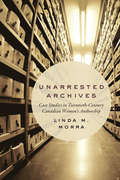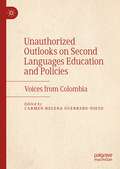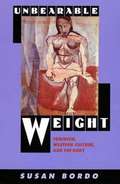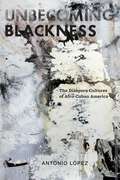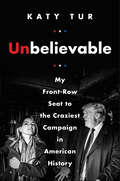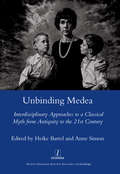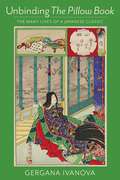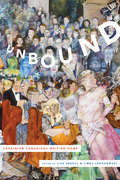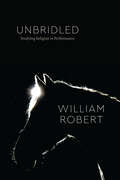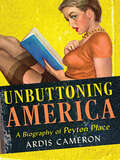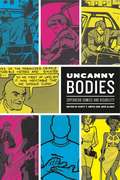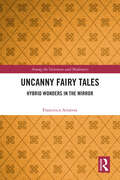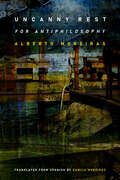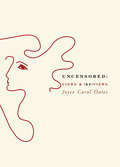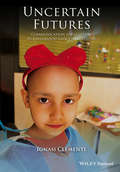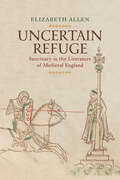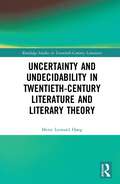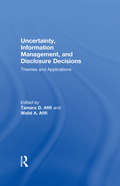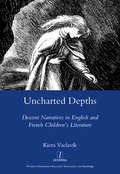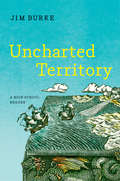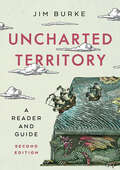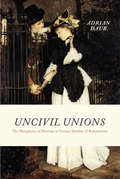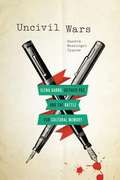- Table View
- List View
Unarrested Archives
by Linda M. MorraCalling upon the archives of Canadian writers E. Pauline Johnson (1861-1913), Emily Carr (1871-1945), Sheila Watson (1909-1998), Jane Rule (1931-2007), and M. NourbeSe Philip (1947- ), Linda M. Morra explores the ways in which women's archives have been uniquely conceptualized in scholarly discourses and shaped by socio-political forces. She also provides a framework for understanding the creative interventions these women staged to protect their records. Through these case studies, Morra traces the influence of institutions such as national archives and libraries, and regulatory bodies such as border service agencies on the creation, presentation, and preservation of women's archival collections.The deliberate selection of the five literary case studies allows Morra to examine changing archival practices over time, shifting definitions of nationhood and national literary history, varying treatments of race, gender, and sexual orientation, and the ways in which these forces affected the writers' reputations and their archives. Morra also productively reflects on Jacques Derrida's Archive Fever and postmodern feminist scholarship related to the relationship between writing, authority, and identity to showcase the ways in which female writers in Canada have represented themselves and their careers in the public record.
Unauthorized Outlooks on Second Languages Education and Policies: Voices from Colombia
by Carmen Helena Guerrero-NietoThis edited book presents a critical vision of language and education policies and practices in Colombia, examining neoliberal perspectives which influence the promotion of English at all levels in the Colombian educational system. Some of the chapters emphasize questions of language teacher recognition and empowerment, while others focus on both teachers and students’ visions of national policies, particularly with regard to colonial and Eurocentric discourses and subsequent discriminatory practices. The volume throws light on recent language and education policies and practices in a South American country where much current research in this area is published in Spanish but not in English, and it gives visibility to voices that are often missing from the global conversation around English language teaching (ELT). Making these voices heard is part of a decolonial project that gives legitimacy to "unauthorized outlooks", embodies knowledge, and focuses on presenting alternatives to second language teaching-learning and research practices from the Global North ontoepistemology. This book will be of interest to students and scholars of ELT, Language Policies and Planning, Applied Linguistics, and Postcolonial and Decolonial Studies. It also has international appeal, as its localized gaze can bring about important considerations regarding other local knowledges.
Unbearable Weight: Feminism, Western Culture, and the Body
by Susan BordoFantastic study of women and their bodies. This 10th anniversary edition has a new preface by the author plus a foreword by Leslie Haywood, feminist scholar superstar, an authority on women athletes and body builders. When originally published in 1993, it made the list of NYT Notable Books of the Year.
Unbecoming Blackness: The Diaspora Cultures of Afro-Cuban America (American Literatures Initiative #3)
by Antonio Lopez2014 Runner-Up, MLA Prize in United States Latina and Latino and Chicana and Chicano Literary and Cultural StudiesIn Unbecoming Blackness, Antonio López uncovers an important, otherwise unrecognized century-long archive of literature and performance that reveals Cuban America as a space of overlapping Cuban and African diasporic experiences. López shows how Afro-Cuban writers and performers in the U.S. align Cuban black and mulatto identities, often subsumed in the mixed-race and postracial Cuban national imaginaries, with the material and symbolic blackness of African Americans and other Afro-Latinas/os. In the works of Alberto O’Farrill, Eusebia Cosme, Rómulo Lachatañeré, and others, Afro-Cubanness articulates the African diasporic experience in ways that deprive negro and mulato configurations of an exclusive link with Cuban nationalism. Instead, what is invoked is an “unbecoming” relationship between Afro-Cubans in the U.S and their domestic black counterparts. The transformations in Cuban racial identity across the hemisphere, represented powerfully in the literary and performance cultures of Afro-Cubans in the U.S., provide the fullest account of a transnational Cuba, one in which the Cuban American emerges as Afro-Cuban-American, and the Latino as Afro-Latino.
Unbelievable: My Front-Row Seat to the Craziest Campaign in American History
by Katy TurThe New York Times bestseller. “This book couldn’t be more timely, appearing as President Trump ratchets up his attacks on the news media.” —Jill Abramson, The New York Times Book ReviewKaty Tur lived out of a suitcase for a year and a half, following Trump around the country, powered by packets of peanut butter and kept clean with dry shampoo. She visited forty states with the candidate, made more than three,800 live television reports, and tried to endure a gazillion loops of Elton John’s “Tiny Dancer” —a Trump rally playlist staple.From day one to day 500, Tur documented Trump’s inconsistencies, fact-checked his falsities, and called him out on his lies. In return, Trump repeatedly singled Tur out. He tried to charm her, intimidate her, and shame her. At one point, he got a crowd so riled up against Tur, Secret Service agents had to walk her to her car.None of it worked. Facts are stubborn. So was Tur. She was part of the first women-led politics team in the history of network news. The Boys on the Bus became the Girls on the Plane. But the circus remained. Through all the long nights, wild scoops, naked chauvinism, dodgy staffers, and fevered debates, no one had a better view than Tur.Unbelievable is her darkly comic, fascinatingly bizarre, and often scary story of how America sent a former reality show host to the White House. It’s also the story of what it was like for Tur to be there as it happened, inside a no-rules world where reporters were spat on, demeaned, and discredited. Unbelievable is a must-read for anyone who still wakes up and wonders, Is this real life?
Unbinding Medea
by Heike BartelMedea - simply to mention her name conjures up echoes and cross-connections from Antiquity to the present. The vengeful wife, the murderess of her own children, the frail, suicidal heroine, the archetypal Bad Mother, the smitten maiden, the barbarian, the sorceress, the abused victim, the case study for a pathology. For more than two thousand years, she has arrested the eye in paintings, reverberated in opera, called to us from the stage. She demands the most interdisciplinary of study, from ancient art to contemporary law and medicine; she is no more to be bound by any single field of study than by any single take on her character. The contributors to this wide-ranging volume are Brian Arkins, Angela J. Burns, Anthony Bushell, Richard Buxton, Peter A. Campbell, Margherita Carucci, Daniela Cavallaro, Robert Cowan, Hilary Emmett, Edith Hall, Laurence D. Hurst, Ekaterini Kepetzis, Ivar Kvistad, Catherine Leglu, Yixu Lue, Edward Phillips, Elizabeth Prettejohn, Paula Straile-Costa, John Thorburn, Isabelle Torrance, Terence Stephenson, and Amy Wygant.
Unbinding The Pillow Book: The Many Lives of a Japanese Classic
by Gergana IvanovaAn eleventh-century classic, The Pillow Book of Sei Shōnagon is frequently paired with The Tale of Genji as one of the most important works in the Japanese canon. Yet it has also been marginalized within Japanese literature for reasons including the gender of its author, the work’s complex textual history, and its thematic and stylistic depth. In Unbinding The Pillow Book, Gergana Ivanova offers a reception history of The Pillow Book and its author from the seventeenth century to the present that shows how various ideologies have influenced the text and shaped interactions among its different versions.Ivanova examines how and why The Pillow Book has been read over the centuries, placing it in the multiple contexts in which it has been rewritten, including women’s education, literary scholarship, popular culture, “pleasure quarters,” and the formation of the modern nation-state. Drawing on scholarly commentaries, erotic parodies, instruction manuals for women, high school textbooks, and comic books, she considers its outsized role in ideas about Japanese women writers. Ultimately, Ivanova argues for engaging the work’s plurality in order to achieve a clearer understanding of The Pillow Book and the importance it has held for generations of readers, rather than limiting it to a definitive version or singular meaning. The first book-length study in English of the reception history of Sei Shōnagon, Unbinding The Pillow Book sheds new light on the construction of gender and sexuality, how women’s writing has been used to create readerships, and why ancient texts continue to play vibrant roles in contemporary cultural production.
Unbound: Ukrainian Canadians Writing Home
by Lisa Grekul Lindy LedohowskiWhat does it mean to be Ukrainian in contemporary Canada? The Ukrainian Canadian writers in Unbound challenge the conventions of genre - memoir, fiction, poetry, biography, essay - and the boundaries that separate ethnic and authorial identities and fictional and non-fictional narratives. These intersections become the sites of new, thought-provoking and poignant creative writing by some of Canada's best-known Ukrainian Canadian authors.To complement the creative writing, editors Lisa Grekul and Lindy Ledohowski offer an overview of the history of Ukrainian settlement in Canada and an extensive bibliography of Ukrainian Canadian literature in English. Unbound is the first such exploration of Ukrainian Canadian literature and a book that should be on the shelves of Canadian literature fans and those interested in the study of ethnic, postcolonial, and diasporic literature.
Unbridled: Studying Religion in Performance (Class 200: New Studies in Religion)
by William RobertA study of religion through the lens of Peter Shaffer’s play Equus. In Unbridled, William Robert uses Equus, Peter Shaffer’s enigmatic play about a boy passionately devoted to horses, to think differently about religion. For several years, Robert has used Equus to introduce students to the study of religion, provoking them to conceive of religion in unfamiliar, even uncomfortable ways. In Unbridled, he is inviting readers to do the same. A play like Equus tangles together text, performance, practice, embodiment, and reception. Studying a play involves us in playing different roles, as ourselves and others, and those roles, as well as the imaginative work they require, are critical to the study of religion. By approaching Equus with the reader, turning the play around and upside-down, Unbridled transforms standard approaches to the study of religion, engaging with themes including ritual, sacrifice, worship, power, desire, violence, and sexuality, as well as thinkers including Judith Butler, Sigmund Freud, Karl Marx, Friedrich Nietzsche, and Jonathan Z. Smith. As Unbridled shows, the way themes and theories play out in Equus challenges us to reimagine the study of religion through open questions, contrasting perspectives, and alternative modes of interpretation and appreciation.
Unbuttoning America: A Biography of "Peyton Place"
by Ardis CameronPublished in 1956, Peyton Place became a bestseller and a literary phenomenon. A lurid and gripping story of murder, incest, female desire, and social injustice, it was consumed as avidly by readers as it was condemned by critics and the clergy. Its author, Grace Metalious, a housewife who grew up in poverty in a New Hampshire mill town and had aspired to be a writer from childhood, loosely based the novel's setting, characters, and incidents on real-life places, people, and events. The novel sold more than 30 million copies in hardcover and paperback, and it was adapted into a hit Hollywood film in 1957 and a popular television series that aired from 1964 to 1969. More than half a century later, the term "Peyton Place" is still in circulation as a code for a community harboring sordid secrets.In Unbuttoning America, Ardis Cameron mines extensive interviews, fan letters, and archival materials including contemporary cartoons and cover images from film posters and foreign editions to tell how the story of a patricide in a small New England village circulated over time and became a cultural phenomenon. She argues that Peyton Place, with its frank discussions of poverty, sexuality, class and ethnic discrimination, and small-town hypocrisy, was more than a tawdry potboiler. Metalious's depiction of how her three central female characters come to terms with their identity as women and sexual beings anticipated second-wave feminism. More broadly, Cameron asserts, the novel was also part of a larger postwar struggle over belonging and recognition. Fictionalizing contemporary realities, Metalious pushed to the surface the hidden talk and secret rebellions of a generation no longer willing to ignore the disparities and domestic constraints of Cold War America.
Uncanny Bodies: Superhero Comics and Disability (Graphic Medicine #18)
by Scott T. Smith José AlanizSuperhero comics reckon with issues of corporeal control. And while they commonly deal in characters of exceptional or superhuman ability, they have also shown an increasing attention and sensitivity to diverse forms of disability, both physical and cognitive. The essays in this collection reveal how the superhero genre, in fusing fantasy with realism, provides a visual forum for engaging with issues of disability and intersectional identity (race, ethnicity, class, gender, and sexuality) and helps to imagine different ways of being in the world.Working from the premise that the theoretical mode of the uncanny, with its interest in what is simultaneously known and unknown, ordinary and extraordinary, opens new ways to think about categories and markers of identity, Uncanny Bodies explores how continuums of ability in superhero comics can reflect, resist, or reevaluate broader cultural conceptions about disability. The chapters focus on lesser-known characters—such as Echo, Omega the Unknown, and the Silver Scorpion—as well as the famous Barbara Gordon and the protagonist of the acclaimed series Hawkeye, whose superheroic uncanniness provides a counterpoint to constructs of normalcy. Several essays explore how superhero comics can provide a vocabulary and discourse for conceptualizing disability more broadly. Thoughtful and challenging, this eye-opening examination of superhero comics breaks new ground in disability studies and scholarship in popular culture.In addition to the editors, the contributors are Sarah Bowden, Charlie Christie, Sarah Gibbons, Andrew Godfrey-Meers, Marit Hanson, Charles Hatfield, Naja Later, Lauren O’Connor, Daniel J. O'Rourke, Daniel Pinti, Lauranne Poharec, and Deleasa Randall-Griffiths.
Uncanny Bodies: Superhero Comics and Disability (Graphic Medicine)
by Scott T. Smith José AlanizSuperhero comics reckon with issues of corporeal control. And while they commonly deal in characters of exceptional or superhuman ability, they have also shown an increasing attention and sensitivity to diverse forms of disability, both physical and cognitive. The essays in this collection reveal how the superhero genre, in fusing fantasy with realism, provides a visual forum for engaging with issues of disability and intersectional identity (race, ethnicity, class, gender, and sexuality) and helps to imagine different ways of being in the world.Working from the premise that the theoretical mode of the uncanny, with its interest in what is simultaneously known and unknown, ordinary and extraordinary, opens new ways to think about categories and markers of identity, Uncanny Bodies explores how continuums of ability in superhero comics can reflect, resist, or reevaluate broader cultural conceptions about disability. The chapters focus on lesser-known characters—such as Echo, Omega the Unknown, and the Silver Scorpion—as well as the famous Barbara Gordon and the protagonist of the acclaimed series Hawkeye, whose superheroic uncanniness provides a counterpoint to constructs of normalcy. Several essays explore how superhero comics can provide a vocabulary and discourse for conceptualizing disability more broadly. Thoughtful and challenging, this eye-opening examination of superhero comics breaks new ground in disability studies and scholarship in popular culture.In addition to the editors, the contributors are Sarah Bowden, Charlie Christie, Sarah Gibbons, Andrew Godfrey-Meers, Marit Hanson, Charles Hatfield, Naja Later, Lauren O’Connor, Daniel J. O'Rourke, Daniel Pinti, Lauranne Poharec, and Deleasa Randall-Griffiths.
Uncanny Fairy Tales: Hybrid Wonders in the Mirror (Among the Victorians and Modernists)
by Francesca ArnavasThere are fairy tales that surprise, destabilise, or even shock us: these are uncanny fairy tales that manipulate familiar stories in creative and bewildering ways in order to express new meanings. This work analyses these tales, basing its approach on a reformulation of Freud’s concept of the uncanny. Through a cognitive outlook the employed theoretical framework provides new perspectives on the study of experimental literary fairy tales. Considering English-language literature, complex and unsettling reinterpretations of the fairy-tale discourse began to appear during the Victorian Age, later resurfacing as a postmodern trend. This research individuates uncanny-related narrative techniques and cognitive responses as means to decodify and explore these tales, and as ways to discover unseen connections between Victorian and postmodern texts. The new theorisation of the uncanny is linked with three subconcepts: mirror, hybridity, and wonder, which function as tools to describe and investigate the cognitive and emotional entanglements characterising enigmatic and disorienting fairy tales.
Uncanny Rest: For Antiphilosophy
by Alberto MoreirasIn Uncanny Rest Alberto Moreiras offers a meditation on intellectual life under the suspension of time and conditions of isolation. Focusing on his personal day-to-day experiences of the “shelter-in-place” period during the first months of the coronavirus pandemic, Moreiras engages with the limits and possibilities of critical thought in the realm of the infrapolitical—the conditions of existence that exceed average understandings of politics and philosophy. In each dated entry he works through the process of formulating a life’s worth of thought and writing while attempting to locate the nature of thought once the coordinates of everyday life have changed. Offering nothing less than a phenomenology of thinking, Moreiras shows how thought happens in and out of a life, at a certain crossroads where memories collide, where conversations with interlocutors both living and dead evolve and thinking during a suspended state becomes provisional and uncertain.
Uncensored: Views & (Re)views
by Joyce Carol OatesUncensored: Views & (Re)views is Joyce Carol Oates's most candid gathering of prose pieces since (Woman) Writer: Occasions & Opportunities. Her ninth book of nonfiction, it brings together thirty-eight diverse and provocative pieces from the New York Review of Books, the Times Literary Supplement, and the New York Times Book Review.Oates states in her preface, "In the essay or review, the dynamic of storytelling is hidden but not absent," and indeed, the voice of these "conversations" echoes the voice of her fiction in its dramatic directness, ethical perspective, and willingness to engage the reader in making critical judgments. Under the heading "Not a Nice Person," such controversial figures as Sylvia Plath, Patricia Highsmith, and Muriel Spark are considered without sentimentality or hyperbole; under "Our Contemporaries, Ourselves," such diversely talented figures as William Trevor, E. L. Doctorow, Kazuo Ishiguro, Michael Connelly, Alice Sebold, Mary Karr, Anne Tyler, and Ann Patchett are examined. In sections of "homages" and "revisits," Oates writes with enthusiasm and clarity of such cultural icons as Emily Brontë, Ernest Hemingway, Carson McCullers, Robert Lowell, Balthus, and Muhammad Ali ("The Greatest"); after a lapse of decades, she (re)considers the first film version of Bram Stoker's Dracula, and Americana, Don DeLillo's first novel, as well as the morality of selling private letters and the nostalgic significance of making a pilgrimage to Henry David Thoreau's Walden Pond.Through these balanced and illuminating essays we see Oates at the top of her form, engaged with forebears and contemporaries, providing clues to her own creative process: "For prose is a kind of music: music creates 'mood.' What is argued on the surface may be but ripples rising from a deeper, subtextual urgency."
Uncertain Futures: Communication and Culture in Childhood Cancer Treatment (Wiley Blackwell Studies in Discourse and Culture)
by Ignasi ClementeThis book examines children and young people’s attempts to participate in conversations about their own treatment throughout uncertain cancer trajectories, including the events leading up to diagnosis, treatment, remission, relapse, and cure or death. Clearly and compellingly written, Clemente relies on a new multi-layered method to identify six cancer communication strategies Illustrates that communication is central to how children, parents, and healthcare professionals constitute, influence, and make sense of the social worlds they inhabit—or that they want to inhabit Provides ethnographic case studies of childhood cancer patients in Spain, using children's own words Examines the challenges of how to talk to and how to encourage patients' involvement in reatment discussions In his critique of the “telling” versus “not telling” debates, Clemente argues that communication should be adjusted to the children’s own needs, and that children's own questions can indicate how much or little they want to be involved Uncertain Futures is the winner of the 15th Annual Modest Reixach Prize.
Uncertain Refuge: Sanctuary in the Literature of Medieval England (The Middle Ages Series)
by Elizabeth AllenTo seek sanctuary from persecution by entering a sacred space is an act of desperation, but also a symbolic endeavor: fugitives invoke divine presence to reach a precarious safe haven that imbues their lives with religious, social, or political significance. In medieval England, sanctuary was upheld under both canon and common law, and up to five hundred people sought sanctuary every year. What they found, however, was not so much a static refuge as a temporary respite from further action—confession and exile—or from further violence—jurisdictional conflict, harrying or starvation, a breaching of the sanctuary.While sanctuary has usually been analyzed as part of legal history, in Uncertain Refuge Elizabeth Allen explores the symbolic consequences of sanctuary seeking in English literary works—miracle collections, chronicles, romances, and drama. She ponders the miracle of a stag's escape from the hunt into a churchyard as well as the account of a fallen political favorite who gains a sort of charisma as he takes sanctuary three times in succession; the figure of Sir Gawain, seeking refuge in a stark land far from the court and Robin Hood, hiding in his local forest refuge among his Merry Men. Her consideration of medieval sanctuary extends to its resonances in a seventeenth-century play about the early Tudor usurper Perkin Warbeck and even into modern America, with the case of a breach of sanctuary in southwest Georgia in 1963, when sheriffs took over a voter registration meeting in a local church.Uncertain Refuge illuminates a fantasy of protection and its impermanence that animated late medieval literary culture, and one that remains poignantly alive, if no longer written into law, in today's troubled political world.
Uncertainty and Undecidability in Twentieth-Century Literature and Literary Theory (Routledge Studies in Twentieth-Century Literature)
by Mette Leonard HøegUndecidability is a fundamental quality of literature and constitutive of what renders some works appealing and engaging across time and in different contexts. This book explores the essential literary notion and its role, function and effect in late nineteenth- and twentieth-century literature and literary theory. The book traces the notion historically, providing a map of central theories addressing interpretative challenges and recalcitrance in literature and showing ‘theory of uncertainty’ to be an essential strand of literary theory. While uncertainty is present in all literature, and indeed a prerequisite for any stabilisation of meaning, the Modernist period is characterised by a particularly strong awareness of uncertainty and its subforms of undecidability, ambiguity, indeterminacy, etc. With examples from seminal Modernist works by Woolf, Proust, Ford, Kafka and Musil, the book sheds light on undecidability as a central structuring principle and guiding philosophical idea in twentieth-century literature and demonstrates the analytical value of undecidability as a critical concept and reading-strategy. Defining undecidability as a specific ‘sustained’ and ‘productive’ kind of uncertainty and distinguishing it from related forms, such as ambiguity, indeterminacy and indistinction, the book develops a systematic but flexible theory of undecidability and outlines a productive reading-strategy based on the recognition of textual and interpretive undecidability.
Uncertainty, Information Management, and Disclosure Decisions: Theories and Applications
by Walid Afifi Tamara AfifiThis volume integrates scholarly work on disclosure and uncertainty with the most up-to-date, cutting edge research, theories, and applications. Uncertainty is an ever-present part of human relationships, and the ways in which people reduce and/or manage uncertainty involves regulating their communication with others through revealing and concealing information. This collection is devoted to collating knowledge in these areas, advancing theory and presenting work that is socially meaningful. This work includes contributions from renowned scholars in interpersonal uncertainty and information regulation, focusing on processes that bridge boundaries within and across disciplines, while maintaining emphasis on interpersonal contexts. Disciplines represented here include interpersonal, family, and health communication, as well as relational and social psychology. Key features of the volume include: comprehensive coverage integrating the latest research on disclosure, information seeking, and uncertainty, a highly theoretical content, socially meaningful in nature (applied to real-world contexts), an interdisciplinary approach that crosses sub-fields within communication. This volume is a unique and timely resource for advanced study in interpersonal, health, or family communication. With its emphasis on theory, the book is an excellent resource for graduate courses addressing theory and/or theory construction, and it will also appeal to scholars interested in applied research.
Uncharted Depths: Descent Narratives in English and French Children's Literature
by Kiera Vaclavik"The descent to the underworld is one of our oldest stories. It recurs in the most influential texts of early European literature - the Odyssey , the Aeneid , the Inferno - and no less so in the classics of children's literature. Vaclavik shows that retellings for young readers certainly shift emphases, working the legend through transformations of all kinds, but also that much of the traditional katabasis story remains firmly in place. The critical study of children's literature remains a relatively new field, in which such fundamental presences have gone largely unnoticed. As Vaclavik demonstrates, many novels which remain lively and resonant for adult readers richly repay critical attention. And if the incomparable explorer's tales of Jules Verne, H. Rider Haggard, Hector Malot and even Lewis Carroll have proved durable beyond all expectations, one reason may be that there is no lure like that of the underworld, and none harder to escape. Kiera Vaclavik is Lecturer in French and Comparative Literature at Queen Mary, University of London."
Uncharted Territory: A High School Reader
by Jim BurkeUncharted Territory is a unique first-edition reader keyed to the challenges, uncertainties, and decisions that all high school students face. Created by Jim Burke, a master teacher with over twenty years of high school teaching experience and bestselling author of numerous professional books, this reader helps students envision identities and possibilities outside of the classroom while balancing new freedoms with new responsibilities after graduation. Its eight units engage students in discussions and activities about education, credo, power, relationships, identity, freedom, decisions, and success. Designed to be used alone or in conjunction with longer works of fiction and nonfiction, Uncharted Territory features opportunities throughout the book and teaching package to link to popular and canonical texts, such as Walden, Hamlet, and Frankenstein.
Uncharted Territory: A Reader and Guide (Second Edition)
by Jim BurkeA thematic reader and writing guide built for today's high school students Curated by Jim Burke, an active high school teacher with more than twenty years of teaching experience, this reader—comprised of nonfiction and interspersed with poems and stories—helps students examine questions that are important to them both in and outside of the classroom. Six new writing chapters offer instruction on the entire writing process, while approachable readings, organized thematically, engage students in thoughtful classroom discussion and activities. Designed to be used alone or in conjunction with longer works, Uncharted Territory can easily be incorporated into the classroom, or assigned alongside independent reading. This purchase offers access to the digital ebook only.
Uncivil Unions: The Metaphysics of Marriage in German Idealism & Romanticism
by Adrian Daub“What a strange invention marriage is!” wrote Kierkegaard. “Is it the expression of that inexplicable erotic sentiment, that concordant elective affinity of souls, or is it a duty or a partnership . . . or is it a little of all that?”Like Kierkegaard a few decades later, many of Germany’s most influential thinkers at the turn of the eighteenth century wondered about the nature of marriage but rejected the easy answers provided by biology and theology. In Uncivil Unions, Adrian Daub presents a truly interdisciplinary look at the story of a generation of philosophers, poets, and intellectuals who turned away from theology, reason, common sense, and empirical observation to provide a purely metaphysical justification of marriage.Through close readings of philosophers like Fichte and Schlegel, and novelists like Sophie Mereau and Jean Paul, Daub charts the development of this new concept of marriage with an insightful blend of philosophy, cultural studies, and theory. The author delves deeply into the lives and work of the romantic and idealist poets and thinkers whose beliefs about marriage continue to shape ideas about gender, marriage, and sex to the present day.
Uncivil Unions: The Metaphysics of Marriage in German Idealism and Romanticism
by Adrian Daub“What a strange invention marriage is!” wrote Kierkegaard. “Is it the expression of that inexplicable erotic sentiment, that concordant elective affinity of souls, or is it a duty or a partnership . . . or is it a little of all that?” Like Kierkegaard a few decades later, many of Germany’s most influential thinkers at the turn of the eighteenth century wondered about the nature of marriage but rejected the easy answers provided by biology and theology. In Uncivil Unions, Adrian Daub presents a truly interdisciplinary look at the story of a generation of philosophers, poets, and intellectuals who turned away from theology, reason, common sense, and empirical observation to provide a purely metaphysical justification of marriage. Through close readings of philosophers like Fichte and Schlegel, and novelists like Sophie Mereau and Jean Paul, Daub charts the development of this new concept of marriage with an insightful blend of philosophy, cultural studies, and theory. The author delves deeply into the lives and work of the romantic and idealist poets and thinkers whose beliefs about marriage continue to shape ideas about gender, marriage, and sex to the present day.
Uncivil Wars: Elena Garro, Octavio Paz, and the Battle for Cultural Memory
by Sandra Messinger CypessThe first English-language book to place the works of Elena Garro (1916–1998) and Octavio Paz (1914–1998) in dialogue with each other, Uncivil Wars evokes the lives of two celebrated literary figures who wrote about many of the same experiences and contributed to the formation of Mexican national identity but were judged quite differently, primarily because of gender. While Paz’s privileged, prize-winning legacy has endured worldwide, Garro’s literary gifts garnered no international prizes and received less attention in Latin American literary circles. Restoring a dual perspective on these two dynamic writers and their world, Uncivil Wars chronicles a collective memory of wars that shaped Mexico, and in turn shaped Garro and Paz, from the Conquest period to the Mexican Revolution; the Spanish Civil War, which the couple witnessed while traveling abroad; and the student massacre at Tlatelolco Plaza in 1968, which brought about social and political changes and further tensions in the battle of the sexes. The cultural contexts of machismo and ethnicity provide an equally rich ground for Sandra Cypess’s exploration of the tandem between the writers’ personal lives and their literary production. Uncivil Wars illuminates the complexities of Mexican society as seen through a tense marriage of two talented, often oppositional writers. The result is an alternative interpretation of the myths and realities that have shaped Mexican identity, and its literary soul, well into the twenty-first century.
